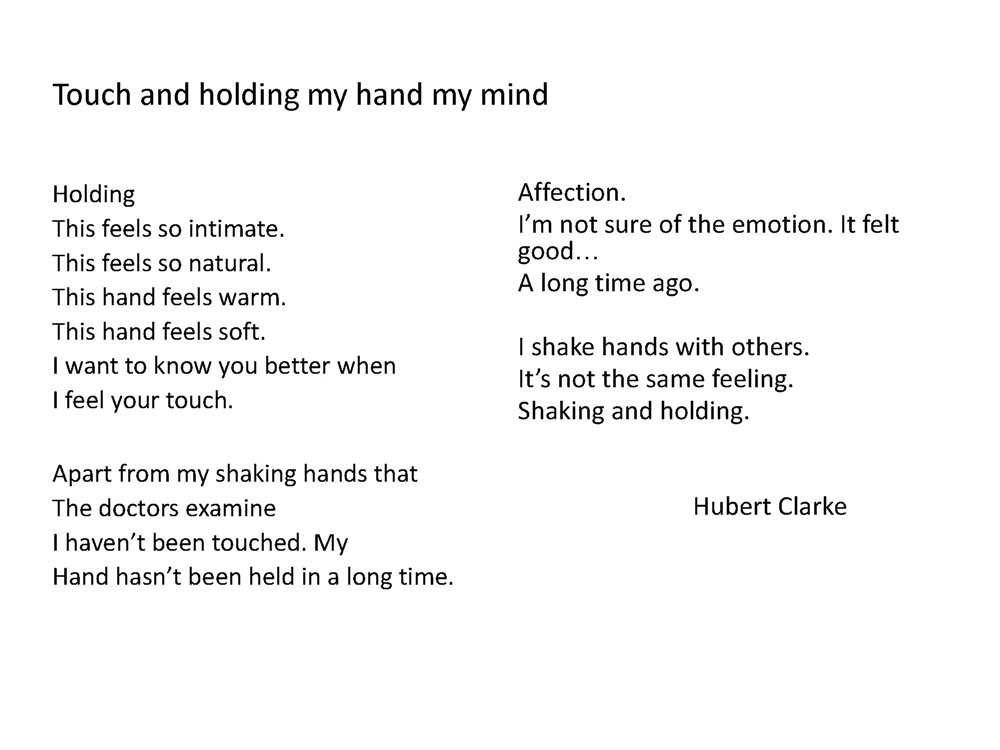Adults need storytime too: how Shared Reading promotes mental health.
Kia ora kotou, I’m Jodie and I work at Nelson Public Libraries.
Story-time sessions for children are understood to be an essential part of what libraries offer with profound and obvious benefits. By the end of this talk, I hope you’ll believe as passionately as I do that story-times for adults, or rather shared reading groups, should be just as common, and that the benefits are just as obvious.
I’m also proposing that we focus on people who need shared reading the most, particularly people with mental health issues.
We’ll be looking at 3 main things:
- Why mental health is an important area for libraries.
- Why shared reading is particularly good for people with mental health issues and my own experience – including setting up and running a group.
- The importance of community partnerships in doing this.
But firstly, let’s have a brief overview of the benefits of reading for pleasure. What’s all the fuss about?
As Librarians I don’t need to convince you of the value of reading for pleasure. The healing effects of reading have been known for thousands of years – with the inscription above the library door in the ancient city of Thebes saying: ’Libraries: The medicine chest of the soul”
Reading’s role in promoting mental health and wellbeing has also been well documented in recent years, with research showing that reading provides a unique and powerful form of relaxation.
The Reading Agency in the UK surveyed what readers found so relaxing…
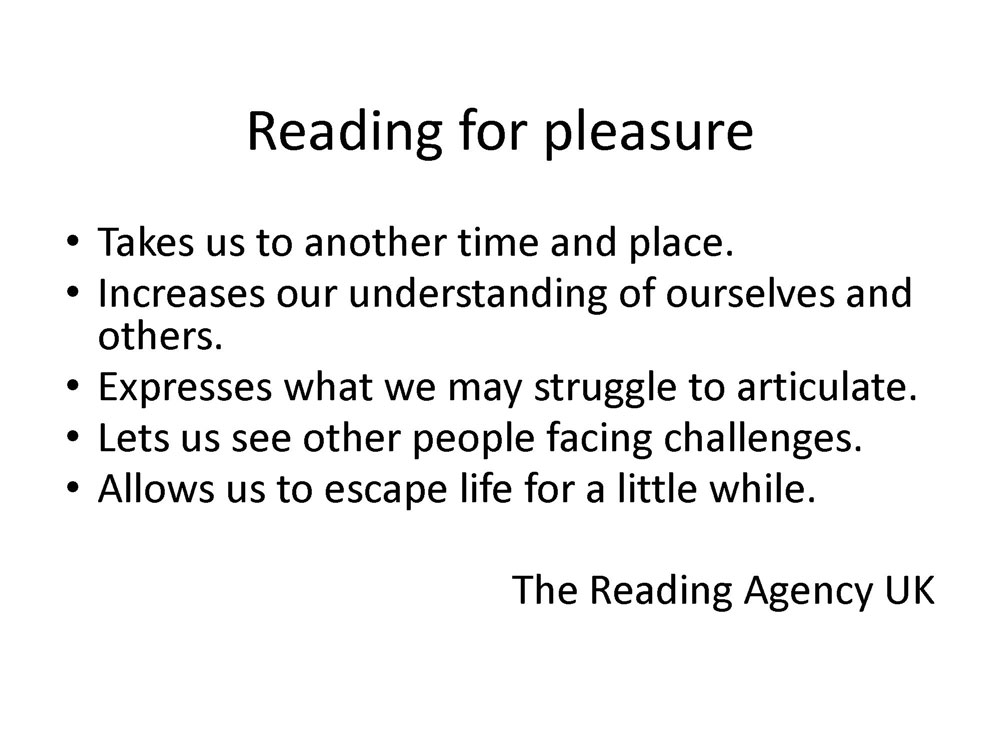
They said that reading:
- takes us to another world, time or place
- increases our understanding of ourselves and of others.
- expresses what we may struggle to articulate.
- lets us see other people facing challenges.
- allows us to escape our life for a little while.
The famous quote by C. S. Lewis gives us a pithier summary: ‘We read to know we’re not alone.’
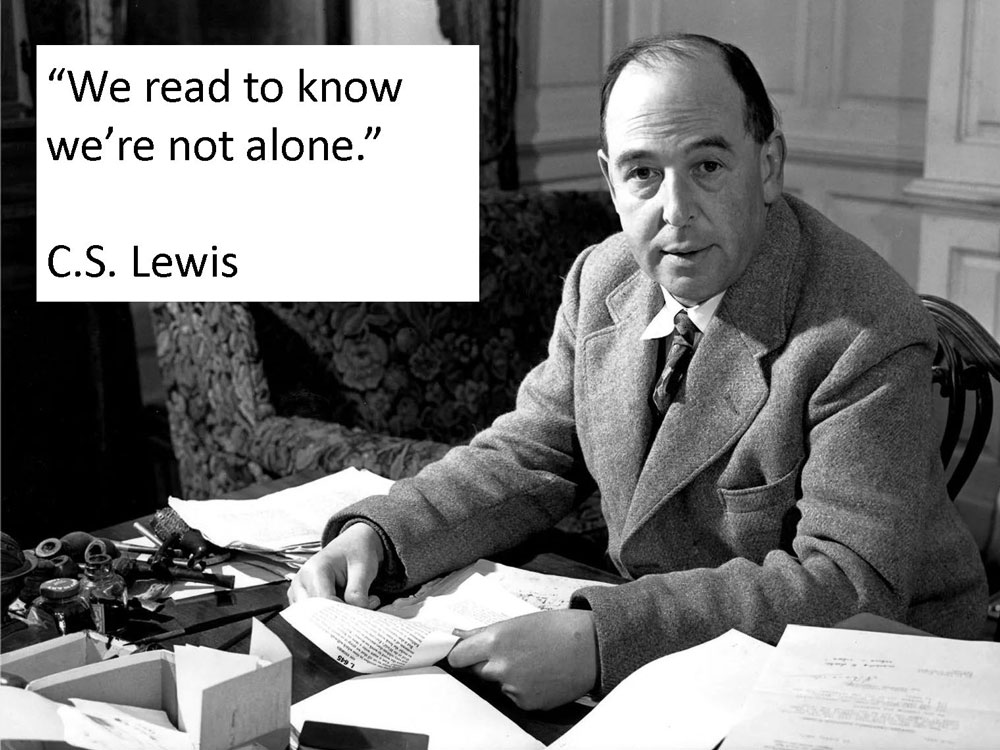
And books can become our friends, or as the writer Alan Bennet says, ‘It’s as if a hand has come out (from the book) and taken yours’.
So far so good about reading’s role in promoting mental health.
But the problem is that the very people who would most benefit from all the good things of reading for pleasure, those who are struggling with their mental health, who may really feel alone – are known to not read as much. That there are barriers to them accessing reading.
When people are depressed or anxious, they often find it difficult to motivate themselves. They lose their pleasure in things they previously enjoyed. It may be hard for them to settle down and concentrate.
And people with long-term mental health issues, may have lost their relationship with reading years ago. Or reading was never a part of their life, maybe because of literacy issues or not having a background that encouraged reading.
Before we go any further I’d like to talk about my background and what’s led to my passion for shared reading and mental health.
We’re going to go back to the year 2000 when I was working as a Mental Health Nurse at the Maudsley Hospital in London, one of the UK’s largest centres for mental health research and training.

I hadn’t heard of the concept of ‘shared reading’ but I’d studied English literature at University before training as a Nurse and I also instinctively knew that literature was a healing art. So I started a poetry-reading group for older adults with mental health issues. A colleague and myself would read poems aloud and then encourage the group to talk about them. We had a very inauspicious start as half the group fell asleep and nobody wanted to share their thoughts and feelings.
But we got better at leading the group, and we soon realised we were onto something powerful. That the group members were connecting with the poems and with each other in quite a unique way, sharing aspects of themselves we hadn’t seen before. I’d always been a solitary reader, but I realised how much there was to be gained from this type of slow and careful reading in a group setting and how much I was learning from others perspectives.
I immigrated to New Zealand about a year after the group started, but the group continued and then I got this poetry book in the post – they’d moved onto writing their own poems.
And when I read the poems, one of them stopped me in my tracks. The writer, Hubert, was an elderly man with a long history of psychosis. He lived alone and had what appeared to be a very limited life. When he attended the day hospital, he was very polite but hardly spoke – a shy man. All the nurses were very fond of him, but we only really engaged with him superficially. We’d read his medical history, we chatted to him on a daily basis, but we really didn’t know him.
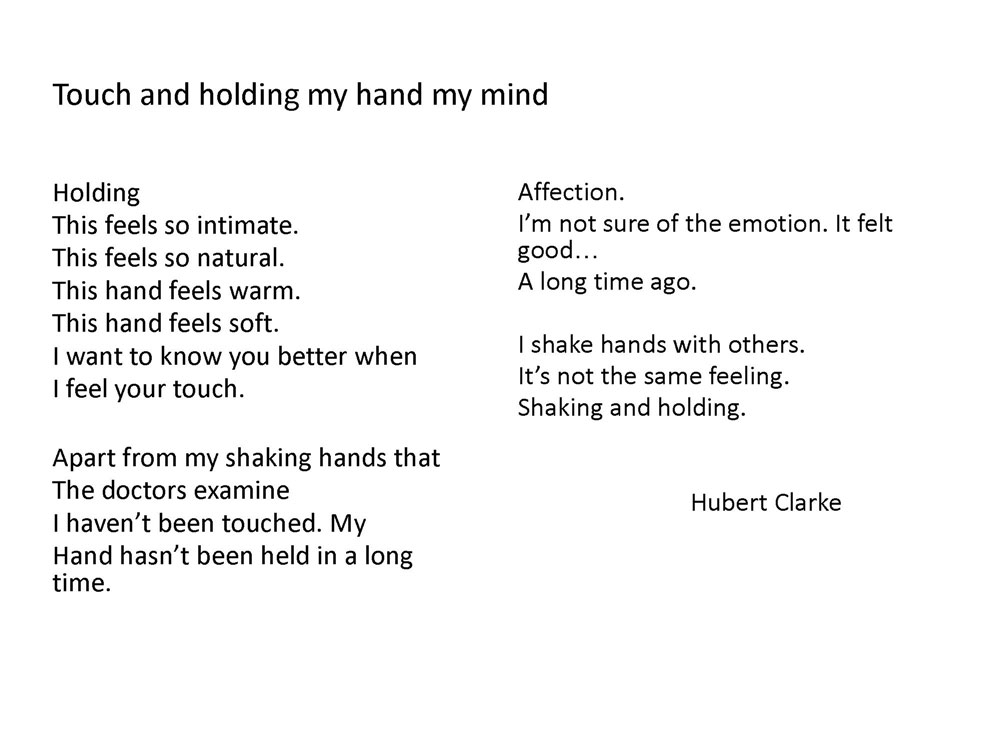
It means many things to me, different things each time I read it, but I always think it conveys something essential about the nature of shared reading.
The words holding and shaking are key.
In a shared reading group we are, metaphorically, holding hands. Both with the hand reaching out to us from the book, as Alan Bennet noted, and with each other. We’re not just shaking hands, having a superficial chat, we’re properly holding hands – feeling emotions we may not have had for years, empathising with how a character in the book feels, and learning who the other people in the group are.

Coming back to the present day, lets look at why mental health is such an important area for libraries to focus on. It’s now well publicised how many people are struggling with their mental health in our communities. In NZ the Royal College of GP’s say that about a third of doctors visits are now related to mental health, and the W.H.O points to a 25% global increase in depression and anxiety since the pandemic, and says that this is just the tip of the iceberg.
There’s also been a lot of recent work on social isolation and the role it plays in many mental health issues and lack of wellbeing. It’s clear that it’s often not the quantity of relationships that is lacking but the quality. That many people are suffering from a lack of intimacy, of a feeling they’re not connecting at a deep enough level with others.
Creative solutions are being called for. Connection is key, and libraries, with our long history of connecting communities, can play a vital role.
The question is how do we engage with these people and encourage them to read – not just because we know it will bring them pleasure, but also because it may be an actual lifeline.

I think that Shared reading is a great solution and a perfect fit for libraries. It promotes health and wellbeing by engaging people in reading for pleasure in a group setting.
So how does it work?
A book (normally a short story or poem) is read aloud by a trained facilitator who then leads the group members to talk about their thoughts and feelings. Very simple really, but there’s quite a lot of special stuff going on:
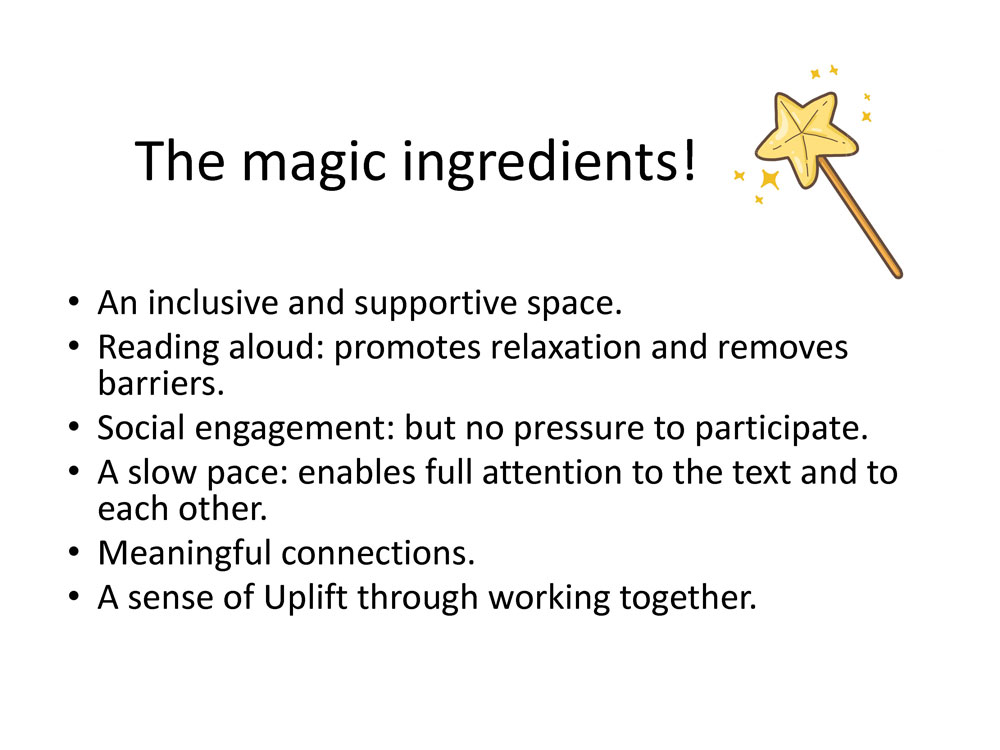
Firstly, the groups provide an inclusive and supportive space where people can enjoy the relaxing experience of being read aloud to, which also removes any literacy barriers. We then talk about our thoughts and feelings in relation to the story or poem- but we make it clear that no-one has to read or respond. So people can be in a social setting without any pressure to participate.
Secondly, we read great literature (literature that’s well written and has things to reflect on) at a slow pace, which also promotes relaxation. This deep reading of great literature is powerful – it really allows people to fully engage with the language and to what’s being expressed. And the slow pace carries over to our discussions – people feel they have time to reflect and aren’t rushed when they speak.
Thirdly, reading in a supportive group setting means that we’re not only making meaningful connections with the text but with other members of the group.
And lastly, it’s really enjoyable and there’s a unique sense of uplift from working together and creating meaning.
Shared Reading has its main roots in the UK about twenty years ago, when Jane Davis, an English teacher, decided she wanted to make good literature more accessible to people. The Reader is now a national charity, providing training and support, to a network of over 700 shared reading groups in the UK, as well as worldwide partner organisations like the Reading Revolution here in New Zealand.
Which brings us back to my story…
The poem that I read to you earlier by Hubert, and my experience running the poetry group at the Maudsley Hospital had really touched me deeply…
…But for about 20 years my career went in a different direction and didn’t include any sort of shared reading. Then a few years ago I started working at Nelson Public Libraries and went on a 4 day ‘Read to Lead” course run by the Reading Revolution here in NZ and it was transformative.
The training was highly practical and comprehensive, and also great fun. It reignited my belief in the power of reading for mental health and wellbeing, and gave me the confidence I needed to know I could successfully lead a group.
I currently run 2 Shared Reading groups. A dementia friendly group in partnership with Alzheimer’s Nelson, and a group for people with ongoing mental health issues in partnership with Nikau Hub – a community mental health centre – and I’m going to talk about my experience of both running and setting up the Nikau Hub group.
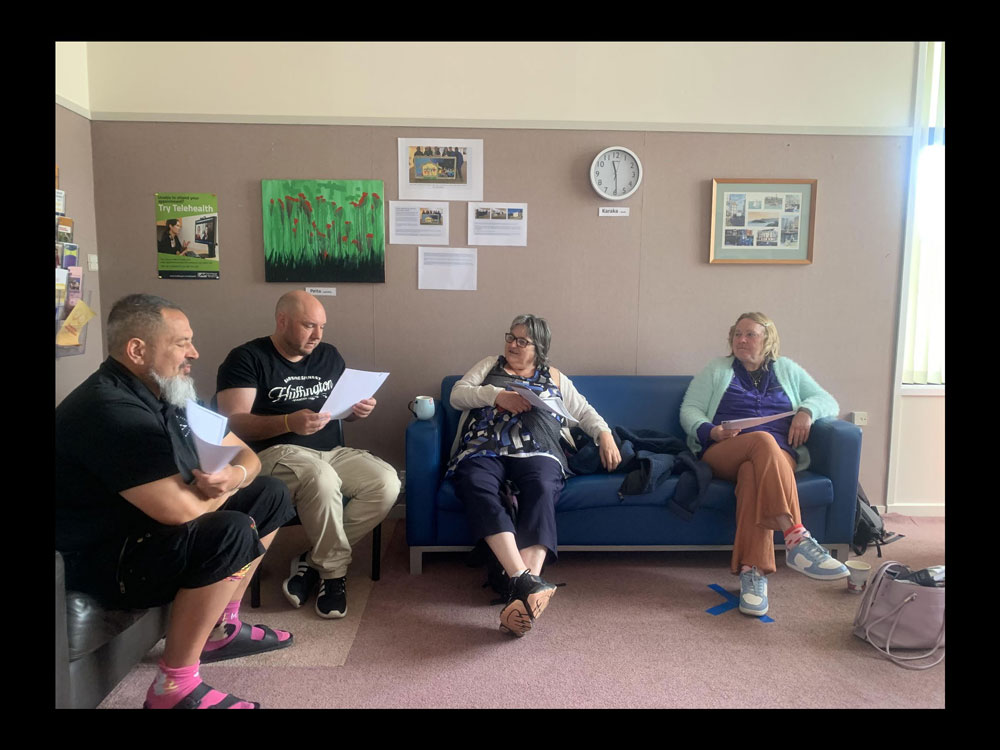
We’ve been meeting every week for over a year now, alternating between the library and Nikau Hub. I facilitate the group and a staff member from the Hub helps.
When we started the group at the library it was eye-opening to see that what we perceive as a safe and welcoming space can be intimidating for some. Two of the members found it obviously stressful to be in a space that they weren’t familiar with. It was then lovely to see that stress change into excitement about what the library could offer them. They both joined the library and we explored our collections. Mark said he hadn’t read a book since school and Jessie wasn’t a confident reader, so some of their books were from our ‘Quick Reads’ section.
Putting people back in touch with reading who may not have had that pleasure for years is amazing. I’ve seen people really struggle to concentrate at first, but noticeably improve as time goes by. Or sometimes people come to the group and say they’re having a bad day, and then they can take more of a back seat, just listening to the story.
It’s great to see confidence improve. When James started the group he was too nervous to read in front of people, but now he offers to read at each group and has a great feeling of achievement.
It can change people’s perspectives about themselves. It’s quite common for people to say they were no good at English at school, and then to have their contributions truly valued changes how they feel about themselves.
It also changes perspectives about literature. People often say they hate poetry. One person said this at the start of a group and then started crying as we read a poem. She said she couldn’t believe how well it had captured her feelings.
And finally, one of the most striking things of a shared reading group for me is the level of trust and intimacy that this type of reading together creates. For people with mental health issues this is especially important – they may feel vulnerable or unwilling to talk about themselves, but talking about a character’s problems can be easier, and they can choose to dial up or down their own level of disclosure.
So far we’ve covered two of my main points – why libraries should focus on mental health, and how shared reading is a great solution for what we can do in this area. My last point is about community partnership.
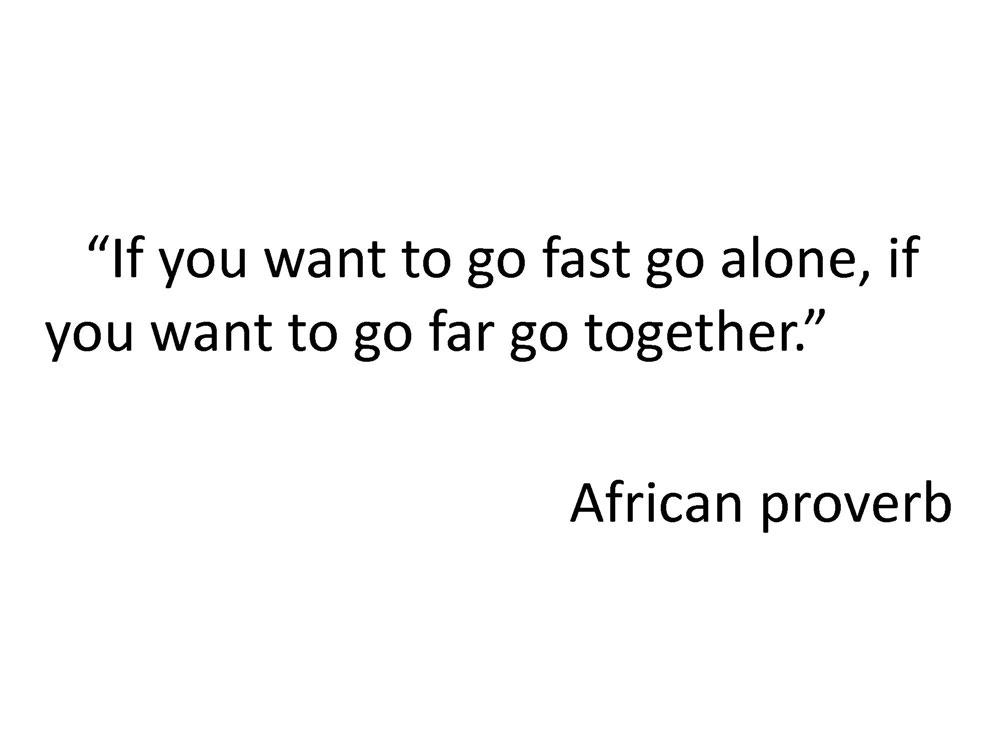
The idea of working with people in our community with mental health needs had been on my mind for a couple of years, and nothing had worked out. (As I’m sure you know, it’s not always easy getting ideas off the ground.) But the training with the Reading Revolution gave me a clear method and also the realisation of the importance of partnership. Partnership makes all the difference.
The Reader organisation in the UK works with really diverse groups of people. In areas such as chronic pain, depression, addiction, criminal justice, abuse and dementia.
The people they train to facilitate the groups may have no background in the difficulties their group members may be facing. But there’s two important points. The first is that the focus on the text is an amazing anchor for whatever comes up in discussion, and the second is that the Reader works in partnership with a huge range of organisations.
Working with people with mental health or other complex issues may feel too hard. Like it’s outside the remit of normal librarian work, or that we don’t have the necessary skills or background to take it on. My background in mental health work drove my passion for this, but with the Shared Reading training and the right partners in place, it’s not at all essential. Partners bring energy and expertise that help make the group work and be sustainable.
Partnerships also expand the reach of our libraries. For example, one of the people in my group was trespassed from the library, but he can still attend the group at Nikau Hub. And if the library is out of a person’s comfort zone, I can engage with them at a place they do feel comfortable in.
What I’ve learnt from my experience is to trust your own unique skills as librarians, and explore possibilities for partnership in your community. There are so many different groups of people who are struggling and for whom shared reading could be a lifeline. If the first partnership you try doesn’t work out, try again.
In conclusion, I hope you now believe as much as I do that Adult “story-times” should be a part of our core programming – just like story-times for children. And that with training and partnership you have the skills and support to deliver them to the people in our communities who most need them, and who may be under-represented in our programming.
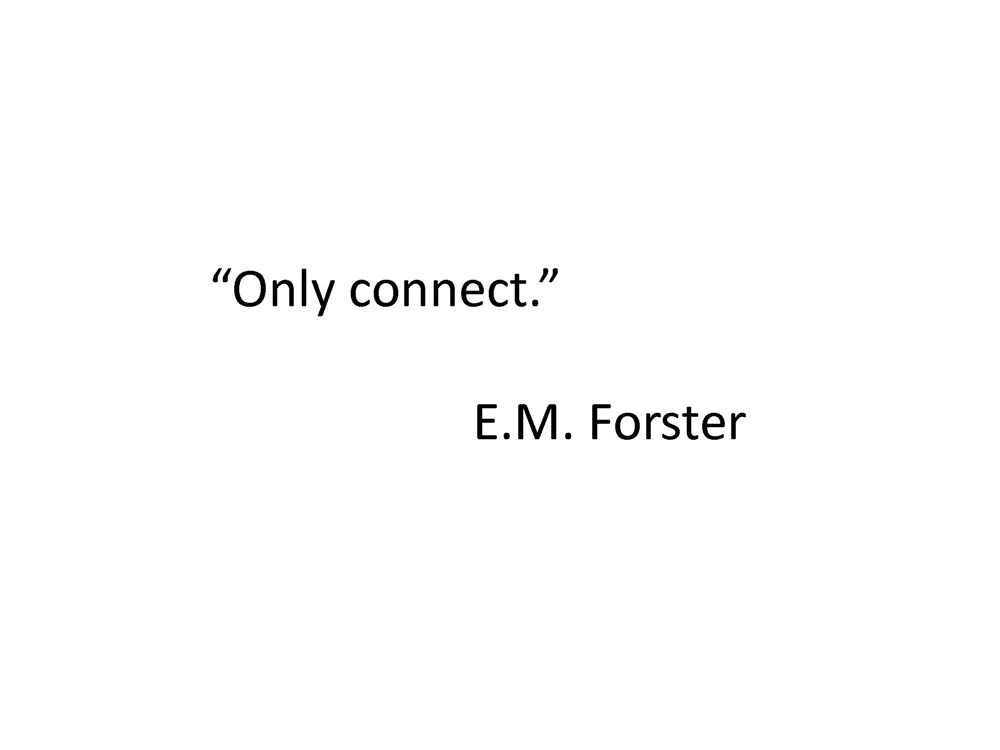
Shared reading is about connection and it has the power to transform lives.
For the group members, it connects them with the healing wisdom of books and gives them meaningful connections with others.
For the library, the partnerships we forge with community organisations enable us to widen our reach and discover new possibilities.
And what’s in it for us? Stepping aside from my professional role, I can honestly say that the Read to Lead training and the groups have been a transformative experience for me. I’m slower and more reflective in how I read, I’m regularly astonished and humbled by what people bring to the group. And every week I have a deeply enjoyable and enriching experience, going on new adventures each time with my fellow explorers.
I look forward to hearing back that the Reading Revolution has been overwhelmed by requests for training and about all the possibilities for community collaboration that you’ve been discovering.
I’m going to leave you with Hubert’s poem as a reminder of the difference quality connection makes in a person’s life.
